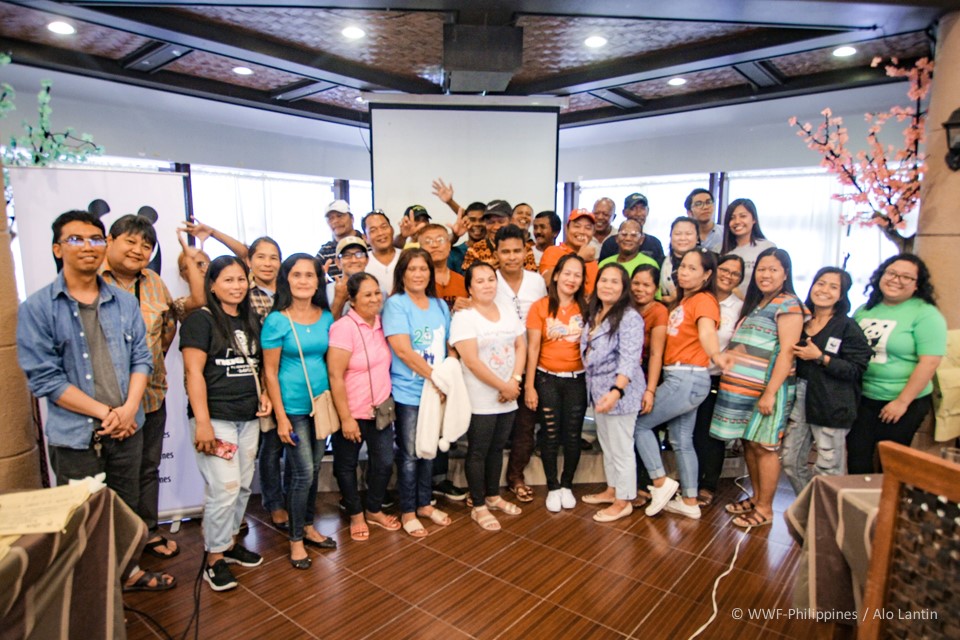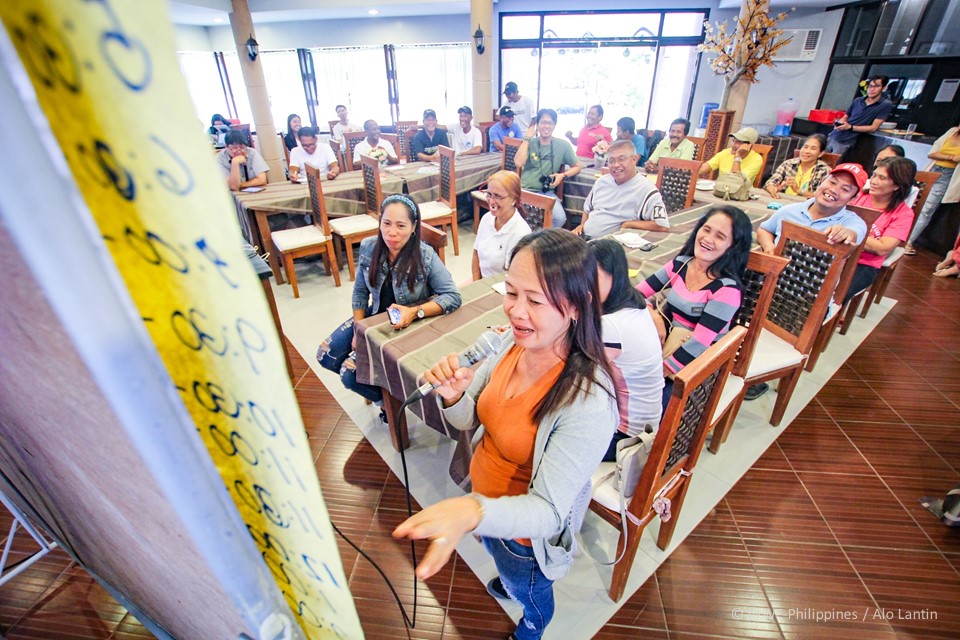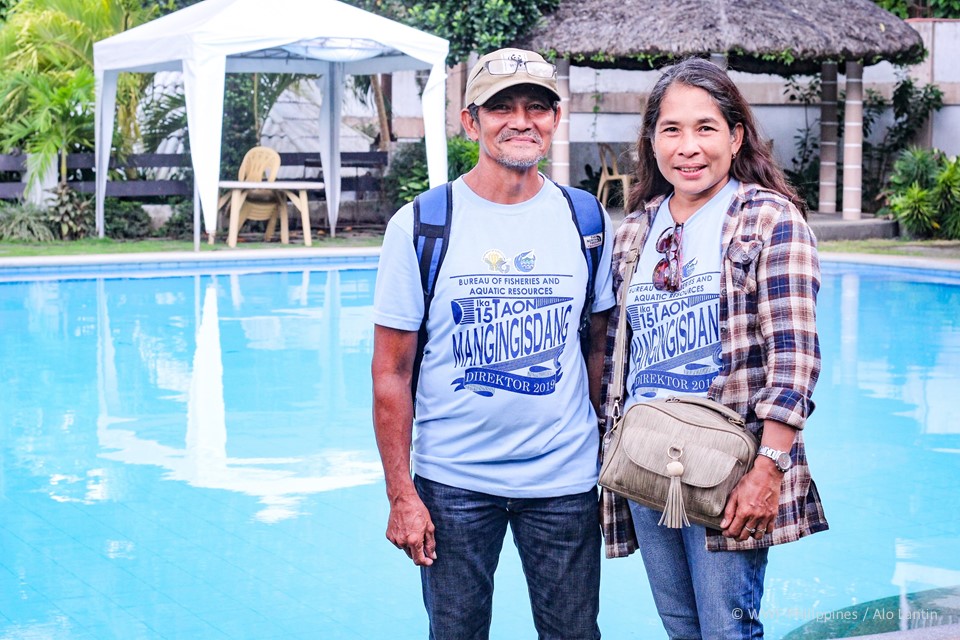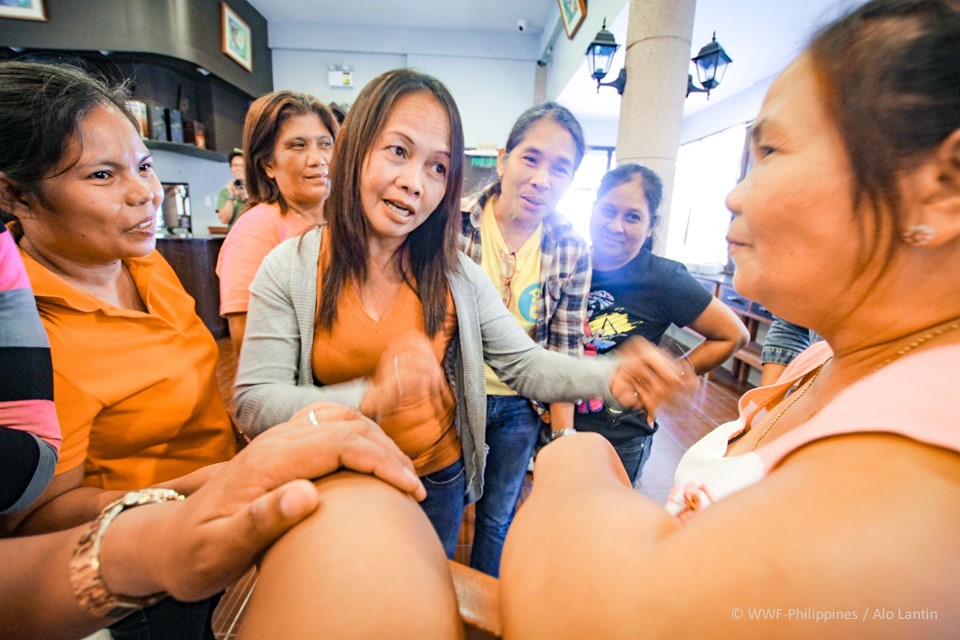Smashing Gender Norms with the Fisherfolk of the Philippines
August 2019

Fishermen and women from Lagonoy Gulf pose with staff from WWF-Philippines and Tambuyog Development Center. WWF-Philippines has been working with the people of Lagonoy Gulf for their empowerment and development. Photograph © Alo Lantin / WWF-Philippines
On the shore and out at sea, the women of Lagonoy Gulf are calling for their right to be recognized and to participate.
On the 8th and 9th of August, the World Wide Fund for Nature (WWF) Philippines, together with Tambuyog Development Center and the Bureau of Fisheries and Aquatic Resources, held a gender sensitivity workshop at Patio de San Jose Resort and Convention Center, Malilipot, with partner fishermen from Lagonoy Gulf in the Bicol region.

A fisherwoman discusses her daily schedule and her role with regards to the different resources her household uses and harvests. The workshop revealed that differences in gender manifest themselves in a variety of ways. Photograph © Alo Lantin / WWF-Philippines
To open the workshop, BFAR Bicol Public Information Officer Nonie Enolva presented the current status quo with regards to gender inequality in the small-scale fishing industry. “These women, they’re so detail oriented. They really structure their day, and every thirty minutes they have something new to do. Then what do they say about their lives? That they just stay at home. That’s not true. There’s far more to what they do,” said Enolva, stressing the point that even the role of managing household affairs is valuable and important.
Following the presentation, participants broke off into smaller groups while representatives from the Tambuyog Development Center probed them about their existing perceptions of the different roles played by men and women. An innovative workshop was conducted as well, which mapped out the various resources being worked by the community, and whether it was the men or the women who got the last say in how they were farmed and used.
The workshops revealed a common conception held by the male participants – that the role of fishing should be left to men, as they are physically stronger. This conception was also shared by many of the women, who saw themselves as the keepers of the house. Fish resources were therefore left to men, while the collection of sea shells on the shore was seen as a job for the women, as it requires less physical ability.
“Who told you women are too weak to fish? Did you ask them? Did you teach them how to? You can’t tell them they can’t fish if you don’t give them the chance to learn how to fish in the first place,” said Tambuyog Development Center Social Enterprise Specialist Ronald Rodriguez, stressing the importance of gender equality in fisheries. These perceptions of gender differences are born from culture and history, agreed Rodriguez, but it is in the best interest of communities for women to be treated fairly.

Melba Abibuag, fisherwoman, and her fisherman husband Jomar. Melba and Jomar fish together, supporting one another as equals for the sake of their families and their community. Photograph © Alo Lantin / WWF-Philippines
As if to hammer the point home, attending the workshop was Melba Abibuag, a fisherwoman from Camarines Sur. Once an overseas Filipino worker based in Hong Kong, Melba returned to the Philippines to escape the SARS outbreak and to be with her fisherman husband.
“I asked her if she wanted to join one time, and she did. We caught a lot of fish that day,” says Jomar Abibuag, husband of Melba. Now back at home in the Philippines, Melba and her husband work together as a team, regularly heading out to sea together.
“When I was in Hong Kong, I heard of this couple who would fish together, and I saw they were well-off. They had money, they had free time, they could afford house help. I thought to myself, if they can do it, why can’t I do it, too? And so I went home to join my husband,” says Melba. Now 56 and 58 years old respectively, they care for their extended families from the gains of their shared catches.
“Of course I want my wife to be empowered. What if I’m not around to help her anymore? I want her to be able to take care of herself.” added Jomar. A shining example of the benefits of gender equality, the Abibuags continue to fish together as they work hard to support one another and the extended family that lives with and relies on them.

Women huddle and talk together as the workshop rolls on. WWF-Philippines hopes that, through fairness and equality in gender, the fishermen and fisherwoman of Lagonoy Gulf will be able to make the most of the opportunities before them. Photograph © Alo Lantin / WWF-Philippines
“All of you couples out there, just talk. Communicate. Don’t just leave each other be, help each other out. Let women do what the men do, too. Then things will be fine,” says Melba. Fisherwomen like her stand as a testament to the importance of woman empowerment and the ways which men and woman can work together for the sake of their families and their communities. Support gender equality with us and help create a world where everyone – and everything – prospers.
The workshop was conducted under WWF-Philippines’ Fish Forward 2 project. The Fish Forward 2 Project raises awareness for sustainable seafood consumption in seventeen countries across the globe, driven by the idea that sustainable seafood is good for both people and the environment.
This project is co-funded by the European Union.
For more information, please contact:
Ms. Joann Binondo
Project Manager, Sustainable Tuna
jbinondo@wwf.org.ph
-
Mr. Dan Ramirez
Communications and Media Manager
dramirez@wwf.org.ph
